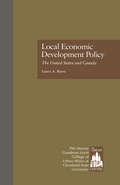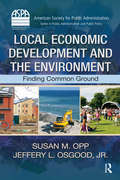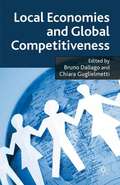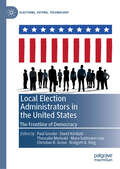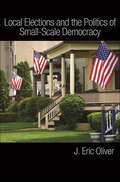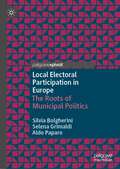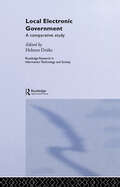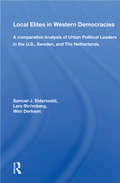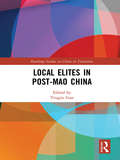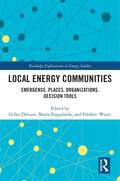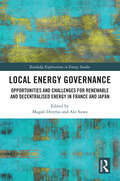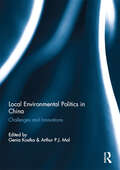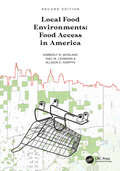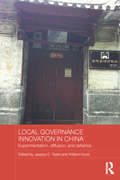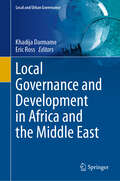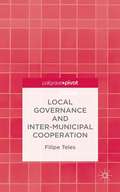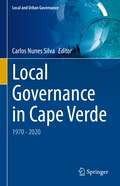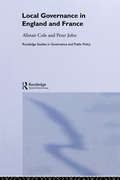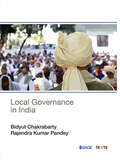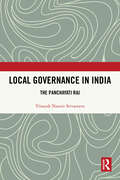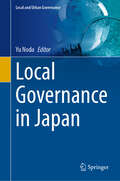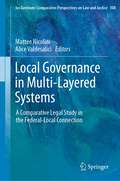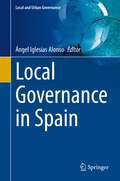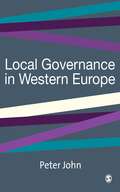- Table View
- List View
Local Economic Development Policy: The United States and Canada (Contemporary Urban Affairs #1)
by Laura A. Reese Urban Center StaffFirst published in 1997. Routledge is an imprint of Taylor & Francis, an informa company.
Local Economic Development and the Environment: Finding Common Ground (ASPA Series in Public Administration and Public Policy)
by Susan M. Opp Jeffery L. Osgood, Jr.A clear and practical examination of complex issues, Local Economic Development and the Environment: Finding Common Ground provides a broad, academic look at the intersection of two important areas for local administrators. In addition to managing development in a strained economic climate, most administrators are also expected to be stewards of the environment. However, economic conditions often leave them with limited options for pursuing economic development and, at the same time, being environmentally mindful. Many find themselves without a clear understanding of the concepts, tools, and best practices available to accomplish this herculean task. Translating complex environmental and economic concepts into easily applicable practices, the book: Gives practitioners the information they need to communicate with consultants, constituents, and officials, and to avoid ideological obstacles Compares regulatory differences between states and other geographical differences Includes examples from across the country to highlight variations in environmental regulations and laws Provides technical, legal, and political insights into the process of pursuing local economic development projects that incorporate protection and awareness Contains case studies that demonstrate the concepts in action, allowing readers to fully grasp the complexities associated with sustainable economic development Discusses how local administrators can balance the economic and environmental needs of the future Bridging the gap between policy-making intention and outcome, this book connects readers with a larger body of research that not only underpins practical applications but also helps them avoid legal, technical, and political obstacles. It provides an arsenal of best practices and everyday, easy-to-use strategies for optimizing the difficult balance between economic development and environmental protection.
Local Economies and Global Competitiveness
by Bruno Dallago Chiara GuglielmettiThe globalized economy depends on local and context-specific factors. This edited volume addresses local-global nexuses via case studies of global interactions in developed and developing areas, and of particular firms' approaches to these issues. The chapters build up a prospectus on how best to create globally capable localities.
Local Election Administrators in the United States: The Frontline of Democracy (Elections, Voting, Technology)
by Paul Gronke David Kimball Bridgett A. King Thessalia Merivaki Mara Suttmann-Lea Christian R. GroseThis book focuses on the more than 8,000 local elections administrators in counties, municipalities, and townships who largely manage the key administrative processes of elections, work with campaigns and candidates, design voting materials and choose voting equipment, staff early, and Election Day polling locations, and communicate with and educate voters. They are the frontline of democracy, and this is the first book that explores who becomes an election administrator; their opinions about election reform and election integrity; how LEOs responded to the unique challenges of the 2020 election which included misinformation and even death threats; and how to move forward to ensure a sustainable, diverse, and sustainable community.
Local Elections and the Politics of Small-Scale Democracy
by J. Eric OliverLocal government is the hidden leviathan of American politics: it accounts for nearly a tenth of gross domestic product, it collects nearly as much in taxes as the federal government, and its decisions have an enormous impact on Americans' daily lives. Yet political scientists have few explanations for how people vote in local elections, particularly in the smaller cities, towns, and suburbs where most Americans live. Drawing on a wide variety of data sources and case studies, this book offers the first comprehensive analysis of electoral politics in America's municipalities. Arguing that current explanations of voting behavior are ill suited for most local contests, Eric Oliver puts forward a new theory that highlights the crucial differences between local, state, and national democracies. Being small in size, limited in power, and largely unbiased in distributing their resources, local governments are "managerial democracies" with a distinct style of electoral politics. Instead of hinging on the partisanship, ideology, and group appeals that define national and state elections, local elections are based on the custodial performance of civic-oriented leaders and on their personal connections to voters with similarly deep community ties. Explaining not only the dynamics of local elections, Oliver's findings also upend many long-held assumptions about community power and local governance, including the importance of voter turnout and the possibilities for grassroots political change.
Local Elections in Britain: A Statistical Digest
by Colin Rallings Michael ThrasherExploring the historical context, the structure and method of operation, Local Elections in Britain clearly addresses the key issues and confusions that surround the local election system including:* the nature and extent of electoral participation including the crucial issue of low turnout* the candidates, and the growing proportion of women challenging for council seats* the performance of political parties, now a central feature of local elections* the dangers of viewing local elections as national opinion pollsDrawing on the results of more than 100,000 local elections dating back over three decades the book is the most comprehensive study of local elections in Britain.
Local Electoral Participation in Europe: The Roots of Municipal Politics
by Silvia Bolgherini Selena Grimaldi Aldo PaparoWhile electoral participation is a traditional topic in political science, voter turnout at the local level is still largely uncharted. There are very few large-N comparative works on municipal turnout and, as a result, a lack of a comprehensive comparative picture of local electoral participation. This book aims to fill that gap by taking an innovative approach to the topic. The volume makes three major advances at the empirical, methodological and theoretical levels. Empirically, it provides a large-N comparison by covering 18 European countries and more than 70,000 municipalities. Methodologically, the book uses the multi-level congruence theory to study municipal turnout in relation to national turnout, exploring the variation between those levels. Theoretically, it bridges the two main (and often mutually exclusive) strands in the literature on local elections – the lower-rank and different-kind approaches – and it assesses the features and mechanisms of local voting.
Local Electronic Government
by Helmut DrükeThis book investigates how the internet is being used as a tool for comprehensively modernizing local government
Local Elites In Western Democracies: A Comparative Analysis Of Urban Political Leaders In The U.s., Sweden, And The Netherlands
by Samuel J. EldersveldMuch insightful scholarship has been devoted to the elaboration of the nature and functions of elites in modern societies. The theories and paradigms which have emerged have evoked both strong support as well as considerable criticism. Testing this conception of the role of elites is a primary goal of the analysis presented here. We investigate in great detail in these three democratic systems the level of elites' concern for their problems, their sense of responsibility (and power) to act, their relations with community groups and the public, and their values. And throughout the analysis we keep in mind the question of "effective action." This study both builds on and diverges from the early comparative research on local elites.
Local Elites in Post-Mao China (Routledge Studies on China in Transition)
by Yingjie GuoThis book provides fresh insights into the study of Chinese elites at the county level and below. By shifting the analytical focus onto the agency of elites at the local level and away from the institutional structures within which they operate, it fills a number of significant gaps in the field. In particular, this book addresses the lacunae through an empirically rich and diverse set of case studies. It proceeds from the premise that the study of local elites can be most fruitful through examining their relations with each other and with the groups that wield power in the community. Particularly pertinent to the analyses are three major relations, namely the relationship between the elites and their environment, between particular types of elites, and between the locality and the upper and lower scales. Ultimately, it concludes that these relations are not only essential to understanding local elites in post-Mao China but also in accounting for socio-political change and in distinguishing China from other types of societies. As a study of local elites in China, this book will be useful to students and scholars of Chinese politics, political sociology and Chinese Studies in general.
Local Energy Communities: Emergence, Places, Organizations, Decision Tools (Routledge Explorations in Energy Studies)
by Gilles DebizetThis book draws on social science analysis to understand the ongoing dynamics within and surrounding local energy communities in reliably electrified countries: Belgium, Canada, Colombia, France, Germany, India, the Netherlands, Spain, Switzerland and the United Kingdom. It offers a comprehensive overview of recent results and thus outlines a diversity of drivers and levers for scaling up energy communities or, at least, local energy sharing. Analysing the main types of energy communities such as collective self-consumption, citizen cooperatives and peer-to-peer digital platforms, the book does not only raise new questions for social scientists, but also offers a comprehensive overview for all those contributing to the circular economy and the decentralization of energy production in inhabited areas where energy consumption is concentrated. This book provides input for the ongoing debates in many European countries implementing the national law on the European directives for energy communities. Furthermore, without evading the antagonism between cooperative and market approaches, or the contradictions between different issues, the book outlines the innovative decision-making tools that can facilitate the development of local energy production and sharing systems. As well as being of interest to postgraduates and researchers in the field of energy studies, this book will be vital to energy professionals looking to support local energy communities’ decision-making and design, who wish to consider sociological, organizational and territorial dimensions.
Local Energy Governance: Opportunities and Challenges for Renewable and Decentralised Energy in France and Japan (Routledge Explorations in Energy Studies)
by Magali Dreyfus and Aki SuwaLocal Energy Governance: Opportunities and Challenges for Renewable and Decentralised Energy in France and Japan examines the extent of the energy transition taking place at a local level in France and Japan, two countries that share ambitious targets regarding the reduction of GHG emissions, their share of renewable energy and their degree of market liberalization. This book observes local energy policies and initiatives and applies an institutional and legal analysis to help identify barriers but also opportunities in the development of renewable energies in the territories. The book will highlight governance features that incubate energy transition at the local level through interdisciplinary contributions that offer legal, political, sociological and technological perspectives. Overall, the book will draw conclusions that will also be informative for other countries aiming at promoting renewable energies. This book will be of great interest to students and scholars of energy policy and energy governance.
Local Environmental Politics in China: Challenges and Innovations
by Genia Kostka & Arthur P.J. MolKnowledge and insight in national environmental governance in China is widespread. However, increasingly it has been acknowledged that the major problems in guiding the Chinese economy and society towards sustainability are to be found at the local level. This book illuminates the fast-changing dynamics of local environmental politics in China, a topic only marginally addressed in the literature. In the course of building up an institutional framework for environmental governance over the last decade, local actors have generated a variety of policy innovations and experiments. In large measure these are creative responses to two main challenges associated with translating national environmental policies into local realities. The first such challenge is apolicy implementation gap stemming from the absence of the state capacity necessary to the implementation of environmental measures. The second challenge refers to the need for local non-state actors to engage in environmental management; oftentimes such aparticipation gap contributes to implementation failures. In recent years, we have seen a multitude of initiatives within China at the provincial level and below designed to bridge bothgaps. Hence, the central aim of this book is to assess these experiments and innovations in local environmental politics.This book was originally published as a special issue of the Journal of Environmental Policy and Planning.
Local Food Environments: Food Access in America
by Kimberly B. Morland Yael M. Lehmann Allison E. Karpyn"In this book, Morland, Lehmann, and Karpyn discuss the critical need for healthy food financing programs as a vehicle to improve food access for all Americans. In my career as a public servant, there are very few legislative achievements that I’m prouder of than the Healthy Food Financing Initiative, which started in my home state of Pennsylvania. The program gained status as a proven and economically sustainable federal program that is helping to improve the quality of life in our neighborhoods: by allowing millions access to healthy, affordable food." – Congressman Dwight Evans United States House of Representatives, Pennsylvania, District 3 "If we work together, we can create a healthy food system that is equitable and accessible to all. This book highlights the importance of healthy food projects like grocery stores, farmers markets, co-ops, and other healthy food retail in revitalizing local communities across the country. Without basic nourishment, kids and families simply won’t be successful – which is why this book is a must read." – Sam Kass President Obama’s Senior Nutrition Policy Advisor and Executive Director of Let’s Move! "Morland and colleagues’ new second edition provides an excellent foundation for courses in food policy and community nutrition. Their detailed review of the economics of local and national food financing will open students’ minds to the complexity inherent in measuring and interpreting outcomes." – Robert S. Lawrence, MD, MACP Founder and Former Director of the Center for a Livable Future Johns Hopkins University, Bloomberg School of Public Health Features ● Describes how disparities in food access formed in the United States ● Includes federal policies and programs aimed at addressing food access in underserved areas, including the Healthy Food Financing Initiative ● Features examples of state initiatives that address poor access to food retailers ● Provides methods for program evaluation utilizing principals of implementation and dissemination science ● Includes critical thinking questions and embedded videos aimed to generate discussions on how restricted local food environments in the United States are rooted in economic disparities that impact food access as well as housing, education, and job opportunities
Local Governance Innovation in China: Experimentation, Diffusion, and Defiance (Routledge Contemporary China Series)
by Jessica C. Teets William HurstDespite a centralized formal structure, Chinese politics and policy-making have long been marked by substantial degrees of regional and local variation and experimentation. These trends have, if anything, intensified as China’s reform matures. Though often remarked upon, the politicsof policy formation, diffusion, and implementation at the subnational level have not previously been comprehensively described, let alone satisfactorily explained. Based on extensive fieldwork, this book explores how policies diffuse across China today, the mechanisms through which local governments actually arrive at specific solutions, and the implications for China’s political development and stability in the years ahead. The chapters examine how local-level institutions solve governance challenges, such as rural development, enterprise reform, and social service provision. Focusing on diverse policy areas that include land use, state-owned enterprise reform, and house churches, the contributors all address the same overarching question: how do local policymakers innovate in each issue area to address a governance challenges and how, if at all, do these innovations diffuse into national politics. As a study of local governance in China today, this book will appeal to both students and scholars of Chinese politics, comparative politics, governance and development studies, and also to policy-makers interested in authoritarianism and governance.
Local Governance and Development in Africa and the Middle East (Local and Urban Governance)
by Eric Ross Khadija DarmameThis edited volume surveys how current local governance policies and development strategies across Africa and the Middle east are advancing Sustainable Development Goals (SDGs). Morocco's recent experience with local development strategies serves as starting point for the discussion. Over the past decade, Morocco has undertaken a variety of initiatives aimed at reducing poverty and social inequalities and providing essential services to marginalized communities. These initiatives provide great opportunities to reshape the spatial organization of regions, and to address chronic local issues of infrastructure and investment. Local governance is the most direct way of providing basic services to populations, helping to alleviate socio-spatial inequalities. Also, it is and will continue to be the best way to engage people and local governments in economic, social and human development agendas. However, placing local governance at the heart of development strategies requires going well beyond participatory approaches to policy making. Local communities and their governments need to be empowered. As responses to the Covid19 epidemic have laid bare, new and more efficient modes of territorial governance are needed at local and regional levels if current global-scale challenges are to be met. While development and governance strategies like Morocco's are framed by global agreements and standards, there is a need to understand them at the regional scale. Are there discernible patterns in how African and Middle Eastern countries design and implement them? This volume assembles case studies from across the region, allowing for understandings that transcend the usual spatial dichotomies between "North" and "Sub-Saharan" Africa, between Africa and the Middle East, and between the "Anglophone" and "Francophone" spheres. The volume builds upon an international conference on the topic held at Al Akhawayn University in Ifrane, Morocco Morocco in February of 2022. The volume is aimed at a readership of researchers and development practitioners, and will be of most direct benefit to advanced undergraduate and graduate-level students.
Local Governance and Inter-municipal Cooperation
by Filipe TelesTerritory and scale have been some of the most relevant topics in recent political science, but do we know enough about cooperation between local governments? How we think about local government has changed significantly and requires us to be equipped with new epistemological gear, considering more variables and social functions of local government than before. For instance, is inter-municipal cooperation a special arrangement? The answer is certainly positive, not as a consequence of its nature when compared to other alternatives of policy coordination and service delivery, but because it captures almost every facet of the complexity of contemporary territorial governance. Bringing relevant case studies, previous research and available literature together, this book will help researchers, students and practitioners with these ideas. The author provides comprehensive information about inter-municipal cooperation and identifies the main gaps in contemporary research.
Local Governance in Cape Verde: 1970 - 2020 (Local and Urban Governance)
by Carlos Nunes SilvaThe book provides a pioneering overview of the evolution of the local government and urban policy in Cape Verde after independence, offering a multi-scale perspective of local governance in Cape Verde from 1970 - 2020. It examines the process of urban development in the country, and in the capital city in particular, and explores the consequences and challenges for spatial planning, housing, urban heritage, and the environment, namely issues related to climate change in the post-independence period.
Local Governance in England and France (Routledge Studies in Governance and Public Policy #6)
by Peter John Alistair ColeLocal Governance in England and France addresses issues at the cutting edge of comparative politics and public policy. The book is based on extensive research and interviews, over 300 in total, with local decision makers in two pairs of cities in England and France: Lille and Leeds; Rennes and Southampton. No other Anglo-French comparative project has ever gone into such depth - based on actual case studies - making this book an invaluable resource for students and professionals alike. The book poses key questions about the changing role of the state, the difficulties of policy coordination in a fragmented institutional context, and about the relationship between governance, networks as well as political and democratic accountability. It will be of great interest to the professional research community, and practitioners in Britain, France and beyond, as well as to students of comparative politics, European public policy, British / French politics, European studies, public management and local government studies.
Local Governance in India
by Bidyut Chakrabarty Rajendra Kumar PandeyLocal Governance in India draws on the basic theoretical and practical aspects of localizing governance and illuminates how local governance unfolds in India. To help comprehend relevant issues contextually, the book focuses on the historical, socio-economic and political milieus, and draws extensively on examples and cases from India. By understanding local governance in the wider political scenario, it also endeavours to reconceptualize local governance in India as integral to the country's macro politics. The book offers a broad analysis of specific programmes, such as MGNREGA, and structures of governance at the grass-roots level, thereby providing insights into relatively less-discussed aspects and helps grasp the concept of governance in a policy perspective. Containing varied examples, case studies and literature review, this textbook would be an ideal companion for students of political science, public administration, urban and rural development, sociology, social work and economics. Key Features: Provides a concise and well-balanced coverage of rural and urban governance in India Incorporates insights into and explanations of both Western and non-Western perspectives of local governance Dwells on contemporary trends in democratization and local governance Makes a projective study of future of local governance in India
Local Governance in India: The Panchayati Raj
by Vinayak Narain SrivastavaLocal governance is a necessary condition for maturation of political and economic democracy. It undermines the vestiges of political authoritarianism and extends democracy to the grass roots. This book presents a study, analysis and an overview of local governance (Panchayati Raj) in India.Popular participation further leads to the emergence of a viable, dynamic, and healthy political culture, providing accessible channels of political articulation, making the institutions much more accountable and much less alienated and, therefore, much more legitimate. The volume, with its special focus on Uttar Pradesh, discusses crucial themes like self-government, political culture, and participatory politics; institutionalisation of local democracy and governance in post-colonial India; dynamics, functioning, and organisation of local governance; local industrialisation and finance; developmental intervention in Panchayati Raj; and local democracy and governance in a microcosm to showcase the potential of local governance as a holistic institution of democracy and development at local levels.This book will be an interesting read for academics and students of political science, public administration, public policy, governance studies, civil service, political sociology, development studies, policymakers, think tanks, non-governmental organisations and professionals working in the area.
Local Governance in Japan (Local and Urban Governance)
by Yu NodaLocal Governance in Japan is the first comprehensive exploration of local government in Japan, examining the sustainability of local governments operating with limited policy resources. This interdisciplinary study integrates insights from public administration, political science, economics, sociology, and business management. Japan has faced significant challenges in ensuring sustainability from rapid economic growth in the mid-20th century to the bubble's burst in the 1990s, and the population decline since 2008, along with large-scale natural disasters. Amid systemic changes—including a 46% reduction in local governments—local administrations have been developing effective cooperative relationships between local governments and exploring the significance of cooperation with citizens, NPOs, and the private sector. Characterized by extensive public facilities and infrastructure, Japan’s local governments provide a model for addressing future governance challenges. This book is essential for scholars, policymakers, and practitioners seeking innovative strategies to maintain public services and navigate the complexities of governance in a resource-constrained world.
Local Governance in Multi-Layered Systems: A Comparative Legal Study in the Federal-Local Connection (Ius Gentium: Comparative Perspectives on Law and Justice #108)
by Matteo Nicolini Alice ValdesaliciThe book provides a comprehensive analysis of local government in federations. It fills the gap in current legal research and positions local government in federal studies through the lenses of comparative law, adopting a more nuanced approach to local government. The book considers the shortcomings between the black-letter constitution and its operational rules. Whether (and how) the regime of local government is implemented is more relevant than its formal-but-ineffective recognition. The comparative survey discloses the variety local institutions take in different federal contexts. Divided into three parts, the book comprises chapters investigating local government in systems that, to various degrees, have been examined and classified as federal. Scholars throughout the world have examined the federal-local connection in aggregative federations, (the USA, Canada, Switzerland, Germany, Australia, and Austria), devolutionary ones (Belgium, Bosnia Herzegovina, Italy, Spain, the UK, Argentina, Brazil, Mexico, and the Russian Federation), as well as in federations beyond the West, where federalism-as-a-colonial-legacy has undergone a process of reinvention affecting the federal-local connection (South Africa, Ethiopia, India, Nigeria, Comoros, Democratic Republic of Congo, Nepal, Palau, Federated States of Micronesia; St. Kitts and Nevis; United Arab Emirates; and Pakistan).
Local Governance in Spain (Local and Urban Governance)
by Ángel Iglesias AlonsoThe book addresses in detail local governance in Spain. In recent decades, local governments in Europe have increasingly found themselves under pressure from a multitude of new challenges, such as demographic change, climate change, fiscal austerity policies, digitization, the demand for more citizen participation in local affairs, and the migration crisis in some of them, to name just a few. Consequently, a wave of political and administrative reforms to address these challenges, pressures and problems, has changed local governance in many countries. In part, these changes were the result of reform policies introduced by national and state governments, often triggered by austerity policies, which has become an overwhelming reality for Spanish local governments that have been forced to introduce innovations in local governance. This book aims to give an account of these innovations in local governance in Spain.This book considers the local political-administrative structure in its dimensions, focusing on the analysis of its party system, electoral competition and political behavior in the local arena, as well as on local finances, all of which are determining elements in urban and rural governance processes. On the occasion of the recent crisis unleashed by Covid-19, the book will also deal with local governance in crisis situations. The book will also contextualize local governance processes in Spain in relation to the trends in local governance observed in other European countries.
Local Governance in Western Europe (SAGE Politics Texts series)
by Dr Peter John`Its strength lies in combining theoretical insights with an impressive range of empirical material. The analysis is subtle and multi-layered.... This is a timely and important book' - Political Studies `Local governance have gained massive attention among scholars and practitioners during the past several years. Peter John's book fills a void in the literature by tracing the historical roots of local governance and by placing his findings in a comparative perspective' - Professor Jon Pierre, University of Gothenburg, Sweden `Peter John has produced a fascinating and stimulating book in which he assesses current developments in urban politics and local government in Europe and suggests how these changes are leading to different patterns of sub-national territorial politics in the EU today. What he has to say is of important interest to all students of local government; comparative politics and of territorial politics more generally' - Michael Goldsmith, University of Salford `this book offers a fascinating comparative analysis... themes such as New Public Management, globalisation, regionalism and privatisation will be relevant to numerous courses in government, politics, public administration and public policy' - West European Politics This text provides a comprehensive introduction to local government and urban politics in contemporary Western Europe. It is the first book to map and explain the change in local political systems and to place these in comparative context. The book introduces students to the traditional structures and institutions of local government and shows how these have been transformed in response to increased economic and political competition, new ideas, institutional reform and the Europeanization of public policy. At the book's core is the perceived transition from local government to local governance. The book traces this key development thematically across a wide range of West European states including: Belgium, France, Greece, Italy, Germany, the Netherlands, Norway, Portugal, Spain and the United Kingdom.
